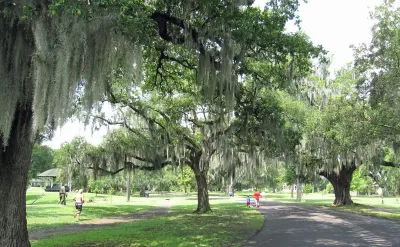Some good news from a state that has seen far too much bad news this year: local officials report that the trees of New Orleans are making a surprisingly strong comeback after devastation wrought by Hurricane Katrina.

"An estimated 320 million trees are thought to have been damaged or killed in Mississippi and Louisiana after Katrina — an unprecedented loss that local researchers in 2007 estimated would change the area’s ecosystem for the worse for generations to come," according to an article by Della Hasselle. "Fast-forward to 2016, however, and officials with New Orleans’ numerous organizations dedicated to protecting green spaces are celebrating what they call an unanticipated comeback for the city’s trees."
City organizations and nonprofit groups have been working hard for more than a decade to restore the city and region's green spaces. According to Hasselle, "the latest tallies show about half of the trees lost to Katrina have been replanted in public spaces alone..." And although a "grand total is difficult to calculate…the number of newly planted trees is even higher" because of the many trees planted on private property, like the yards of residents.
The article details the hard work of the city's Department of Parks and Parkways and organizations like Parkway Partners and the nonprofit NOLA Tree Project in overcoming the many environmental and biological threats that ravaged the region's trees and other plant life after Hurricane Katrina.
Planetizen covered the terrible effects of Hurricane Katrina on the city of New Orlean's greenery in 2007, as well some of the resurgence of the city's parks and open spaces in 2014.
FULL STORY: New Orleans green spaces experiencing unanticipated post-Katrina comeback

Planetizen Federal Action Tracker
A weekly monitor of how Trump’s orders and actions are impacting planners and planning in America.

Map: Where Senate Republicans Want to Sell Your Public Lands
For public land advocates, the Senate Republicans’ proposal to sell millions of acres of public land in the West is “the biggest fight of their careers.”

Restaurant Patios Were a Pandemic Win — Why Were They so Hard to Keep?
Social distancing requirements and changes in travel patterns prompted cities to pilot new uses for street and sidewalk space. Then it got complicated.

Platform Pilsner: Vancouver Transit Agency Releases... a Beer?
TransLink will receive a portion of every sale of the four-pack.

Toronto Weighs Cheaper Transit, Parking Hikes for Major Events
Special event rates would take effect during large festivals, sports games and concerts to ‘discourage driving, manage congestion and free up space for transit.”

Berlin to Consider Car-Free Zone Larger Than Manhattan
The area bound by the 22-mile Ringbahn would still allow 12 uses of a private automobile per year per person, and several other exemptions.
Urban Design for Planners 1: Software Tools
This six-course series explores essential urban design concepts using open source software and equips planners with the tools they need to participate fully in the urban design process.
Planning for Universal Design
Learn the tools for implementing Universal Design in planning regulations.
Heyer Gruel & Associates PA
JM Goldson LLC
Custer County Colorado
City of Camden Redevelopment Agency
City of Astoria
Transportation Research & Education Center (TREC) at Portland State University
Camden Redevelopment Agency
City of Claremont
Municipality of Princeton (NJ)



























